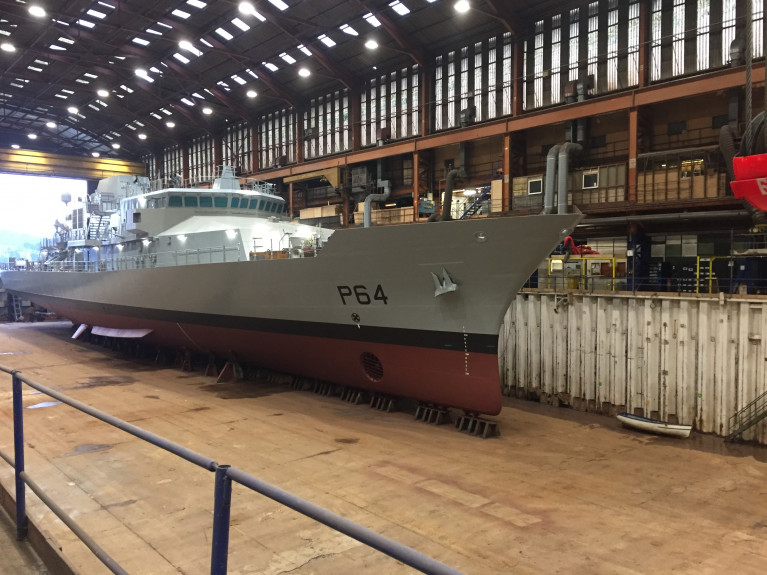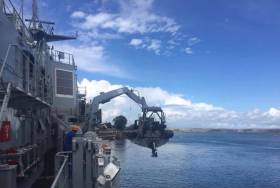Displaying items by tag: Babcock International
Babcock International Secures Contract for Work on Naval Service 'P60' Class in Cork Harbour
Babcock International has been awarded a contract to deliver the installation of variable speed drive system for the central cooling systems on board the Irish Naval Service series of P60 Samuel Beckett class vessels.
Work by the aeropace, defence and security company will commence later this year at the Naval Service Base in Haulbowline, Cork Harbour.
The variable speed drive system was first installed on the central cooling system of the fourth Offshore Patrol Vessel, LÉ George Bernard Shaw (P64) at time of build (by Babcock Marine), enabling the vessel to use a variety of power outputs depending on the conditions and requirements.
The system has proven to be very successful, with the Irish Naval Service requesting it to be installed across the class to save power, fuel and cost, whilst providing a more environmentally friendly running option across the class.
The contract will see Babcock working alongside a range of suppliers to complete the work package for the Irish Naval Service, which will include all aspects of the project from design to engineering assurance.
Gary Simpson, Managing Director, Babcock’s Marine Support business, said: “We’re pleased to continue our close working relationship with the Irish Naval Service and particularly to support this environmentally efficient system.
“We are immensely proud of the work we carried out to build the P60 Samuel Beckett Class and welcome the opportunity to continue supporting these fantastic Offshore Patrol Vessels and the Irish Naval Service."
“Our ability to support global navies is founded on collaboration with a real focus on our customers’ operational success.”
Captain Roberts, Officer Commanding Naval Support Command, said: “The installation of the variable speed drive upgrades on the P60 Samuel Beckett Class demonstrates our climate change objectives, following the Government’s Climate Action Plan, in action. Babcock International have proven know-how to deliver this project, having already installed the system on LÉ George Bernard Shaw, and we look forward to working alongside them."
Could Mystery Boatman Steer Appledore, Devon Shipyard's Future
#Ports&Shipping - A mystery that has got the City's of London's defence and industry experts speculating: just who is behind Boatman Capital Research?
As Sky News reports, Boatman last week published a damning report on Babcock, the engineering services group, which is credited with knocking £130m - or 4% - from the company's stock market valuation.
Its opening paragraph says: "Our investigative team has been researching Babcock for the past six months.
"We have reviewed hundreds of pages of company accounts, government documents and have interviewed numerous sources in the defence sector.
"In our opinion, Babcock has systematically misled investors by burying bad news about its performance.
"We believe that Babcock's senior leadership team - specifically the chairman and chief executive - are not up to the job and their failings will damage the company's future prospects."
For much more on the uncertain future that awaits the West Country shipyard dating to 1855 (click here)
Afloat adds in much more recent times the yard on the River Torridge near Bideford built for the Irish Naval Service, the OPV80/P50 'Roisin' class pair LÉ Roisin in 1999 and two years later LÉ Niamh. This took place when the yard was under ownership of Appledore Shipbuilders, a subsidiary of Langham Industries.
Other orders for Irish interests included Arklow Shipping, when the facility built a pair of bulk-carriers during the early 1990's. The sisters each 7,182dwt, Arklow Brook and Arklow Bridge were sold in recent years as previously reported in Ports & Shipping news.
Plus Appledore constructed the current Shannon Ferries operated double-ended car-ferries, Shannon Dolphin in 1995 and larger half-sister Shannon Breeze in 2000.






























































